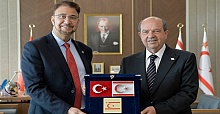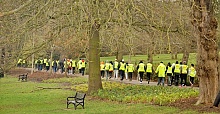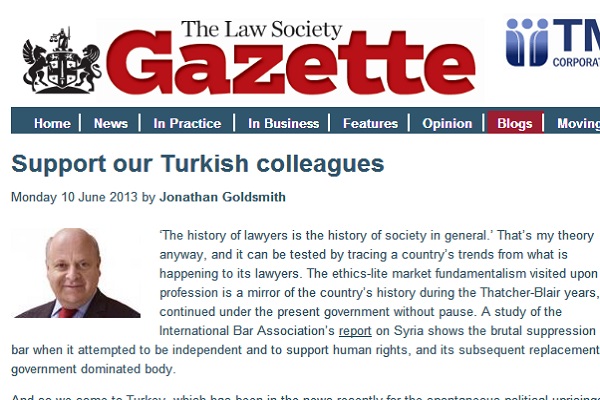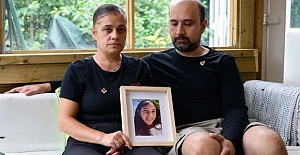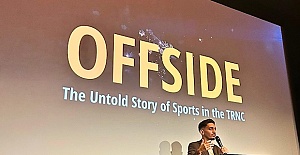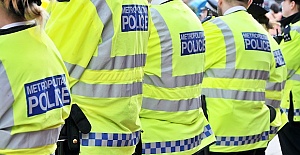‘The history of lawyers is the history of society in general.’ That’s my theory anyway, and it can be tested by tracing a country’s trends from what is happening to its lawyers. The ethics-lite market fundamentalism visited upon our profession is a mirror of the country’s history during the Thatcher-Blair years, and continued under the present government without pause. A study of the International Bar Association’s report on Syria shows the brutal suppression of its bar when it attempted to be independent and to support human rights, and its subsequent replacement by a government dominated body.
And so we come to Turkey, which has been in the news recently for the spontaneous political uprisings in Taksim Square, Istanbul and elsewhere. Some have been surprised that a prosperous, stable country like Turkey has faced such problems. But the recent history of the Turkish legal profession gives clues.
We should start with the recent (2012) report on Turkey by the UN Special Rapporteur on the independence of judges and lawyers, Gabriela Knaul, who is a Brazilian judge. She writes in her conclusions of ‘a widespread perception that lawyers are not considered and treated in the same manner as judges and prosecutors and the difficulties they face in appropriately defending their clients, especially in terrorism-related crimes. A particular concern in this respect is that in various instances lawyers have been criminally charged for activities carried out in the legitimate exercise of their profession when defending suspects accused of terrorism-related charges. There was a steep increase in this worrisome trend in the months preceding the submission of the present report.’
As a current example, there has been a major trial taking place in Turkey since December 2010, called the Sledgehammer case. It is a complex matter involving over three hundred defendants, including retired and active senior officers, generals and admirals of the Turkish Armed Forces who are facing accusations of preparing a “coup d’état”. From the beginning, the defence lawyers have been put under pressure. They eventually refused to appear because they were prevented by the court from discharging their duty to defend the accused. The president and board of the Istanbul Bar Association formally requested the court orally and in writing to conduct the trial according to law and fair trial principles. As a result of this intervention, the president and the board of the Istanbul Bar Association have been indicted on criminal charges of attempting to influence judges unlawfully, with possible prison terms of three months to six years.
The first hearing against the bar’s officers took place before the 2nd Criminal Court of First Instance in Silivri on 17 May 2013. Many international bar leaders, including from the Council of Bars and Law Societies of Europe (CCBE), attended to show their support for the Istanbul Bar Association, and were bussed the 70km from Istanbul to Silivri on the morning of the trial. When they arrived, they were met with a large police presence, and the case was promptly postponed to October by the judge on the grounds that the courtroom was not big enough.
This is not the only case. There have been others, about which the CCBE and other international organisations have written to the Turkish government. Our concern is to support our Turkish colleagues, and their overall representative body, the Union of Turkish Bar Associations.
Of course, it is always difficult to judge another country properly from the outside, but I believe that a fair reading of these cases shows a high-handed government riding roughshod over the balances necessary in a democratic society. That is exactly what I understand to be the complaints of the protesters in Taksim Square and elsewhere, which began over the demolition of a park. Once again, the national story emerges also from the lawyers’ story.
The emblem of the recent protests has been the peaceful ‘woman in the red dress’ being sprayed aggressively with teargas by a policeman. It could as easily be the president and council of the Istanbul bar facing criminal charges for supporting the fundamental principles of the rule of law.
Jonathan Goldsmith is secretary general of the Council of Bars and Law Societies of Europe, which represents about one million European lawyers through its member bars and law societies. He blogs weekly for the Gazette on European affairs
Monday 10 June 2013 Published on http://www.lawgazette.co.uk


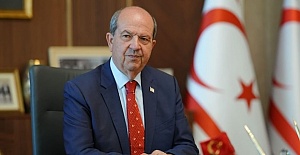 Tatar: “Reaction to MP’s TRNC visit is yet another stark example of the Greek Cypriot leadership’s primitive and domineering mentality”
Tatar: “Reaction to MP’s TRNC visit is yet another stark example of the Greek Cypriot leadership’s primitive and domineering mentality”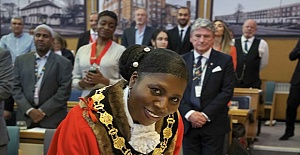 Margaret Greer has been sworn in as the new Mayor of Enfield
Margaret Greer has been sworn in as the new Mayor of Enfield Prime Minister Keir Starmer's 2025 Easter message
Prime Minister Keir Starmer's 2025 Easter message After Nesil Caliskan a by-election will be held in Jubilee ward in Enfield
After Nesil Caliskan a by-election will be held in Jubilee ward in Enfield Team Enfield ranks fifteenth the in London Youth Games
Team Enfield ranks fifteenth the in London Youth Games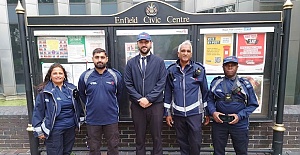 Parking enforcement boosted with more officers on patrol in Enfield
Parking enforcement boosted with more officers on patrol in Enfield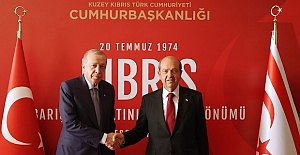 Ersin Tatar meets with President Erdoğan
Ersin Tatar meets with President Erdoğan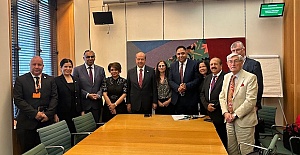 President Ersin Tatar Holds Ministerial-Level Meeting with UK Minister for Europe
President Ersin Tatar Holds Ministerial-Level Meeting with UK Minister for Europe UEFA Europa League and UEFA Conference League draws to be combined into one single show
UEFA Europa League and UEFA Conference League draws to be combined into one single show EuroLeague schedule for 2025-26 season announced
EuroLeague schedule for 2025-26 season announced Zeynep Sonmez becomes first Turkish tennis player to reach third round at Wimbledon
Zeynep Sonmez becomes first Turkish tennis player to reach third round at Wimbledon European champions Arsenal Women will play all of their league matches at the Emirates Stadium
European champions Arsenal Women will play all of their league matches at the Emirates Stadium Enfield Labour welcomes the completion of A10 average speed cameras extension.
Enfield Labour welcomes the completion of A10 average speed cameras extension. TfL opens 2025 grants for community groups to encourage more walking, cycling and active travel in the capital
TfL opens 2025 grants for community groups to encourage more walking, cycling and active travel in the capital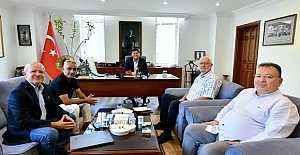 Fethiye Launches International Digital Tourism Campaign with UK-Based Publisher
Fethiye Launches International Digital Tourism Campaign with UK-Based Publisher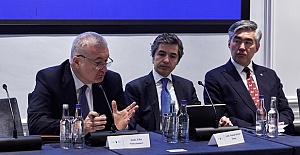 Highlights from the 3rd Trans-Caspian Connectivity Conference in London
Highlights from the 3rd Trans-Caspian Connectivity Conference in London
